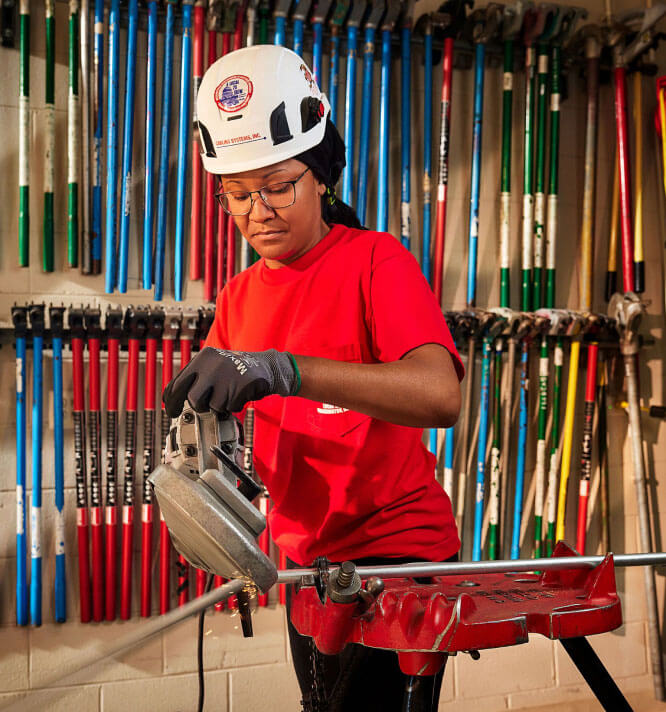
“I think any woman is more than capable of working in the construction industry,” said Sara Shankel. “Women working in the industry now serve as an example of that and as inspiration to the next generation of female electricians.”
We couldn’t agree more. At the Electrical Alliance, one of our goals is to support women who are considering careers in the electrical trade.
Since March is Women’s History Month, we thought it was a particularly great time to speak with a couple of the dedicated women working in the Electrical Alliance. We asked Shankel and Savannah Spencer to tell us what it’s like being in an industry that’s traditionally been dominated by men.
“It’s a great field. It has its ups and downs, just like any job,” said Spencer. “It’s a rewarding career that gives you vast opportunities to work, travel, and teach. I never thought I would be in construction but it’s one of the best decisions I have made—not only for me but for my family as well, especially working for the Local 26.”
Spencer says she entered the industry after realizing she didn’t want to continue her career in probation and parole. When her father-in-law introduced her to the Local 26, she was intrigued.
“I loved the idea of a job in construction,” Spencer said. “There’s always something new to learn and interesting people to meet. The job is always changing, and it gives you opportunities to do something different, learn, build, and teach.”
Shankel also got started after leaving a previous career, with some encouragement from her mother.
“I have always loved building things,” Shankel said. “I took every shop class I could in high school, but ended up going to college and getting my Associate’s in business. I worked at a bank for a couple of years and decided sitting behind a desk was not for me.”
Both women say they receive a lot of fulfillment from the job. For Shankel, some of the brightest moments come from the most challenging projects. She takes pride in the problem-solving element of electrical work.
“As a first year, I worked with a fourth-year apprentice running rigid in an old paper mill,” Shankel said. “Every conduit run was a complicated puzzle of finding support, working around existing conduit and machinery, getting reliable measurements, and spinning it all together in the end. There’s really nothing better than slapping a level on at the end and watching that bubble center up.”
Spencer says it’s impossible to identify “the one” project she’s most proud of because she puts her all into each one. With that said, she feels extra rewarded when she supports team members and apprentices.
“I want to take pride in every pipe run, every wiring and every tray run that I do,” Spencer said. “One of my most memorable moments was being told that I’m a great teacher by a younger apprentice. I believe every worker can teach others. I work hard to try and teach younger apprentices and, in turn, they help teach me.”
Working in the electrical industry isn’t without its challenges, of course. Occasionally, being physically smaller than some of the men can make certain tasks harder (though it makes some tasks easier too, like fitting into small spaces others can’t).
While the industry has come a long way, there are also still individuals who aren’t as accepting of women on job sites.
That isn’t stopping Spencer or Shankel though. Both women are determined to become leaders in the industry and show other women they can too.
“I have found the best method of getting past this is to let your work speak for itself,” said Shankel. “If they still disapprove, that’s their discomfort to deal with.”
“[Women bring] a different set of opinions and ideas,” said Spencer. “I work with men all the time and, [often] I feel, and have been told, that the way I process information is different. I enjoy it and I love to see how other people process their ideas and create solutions that are different from mine. I feel that it helps come up with different solutions to problems.”
Spencer and Shankel are optimistic about the future of women in electrical and construction fields. They both plan to keep advancing their careers while passing on their well-earned knowledge and skills.
“I sincerely hope that more women join the construction field,” said Spencer. “I want to be a journeyman in the field helping to teach others the trade. There are only two females in my current area and both are apprentices. I want to help any woman who wants to join the field, not only as another worker but hopefully create a support system for various women working in this area.”
Shankel says it takes time to master your skills, but it’s always possible—and worth it. “Nobody gets there overnight,” she said. “The future I see is simple: Women equally represented in the construction industry. As for my role, I intend to prove my worth on the job site every day and help recruit women locally.”
We’ll be supporting Spencer and Shankel on their mission to do that every day.
Do you know a woman looking for a career that sets them up for lifelong security and benefits? Check out the Joint Apprenticeship Training Committee’s (JATC) electrical apprenticeship program for details on all three track options and instructions on how to apply.




